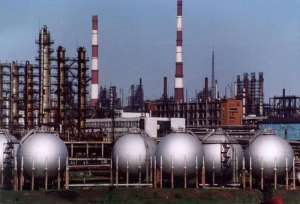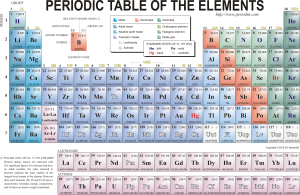 The volume of the global chemical industry is estimated at 2 trillion US dollars. According to the World Bank, in 2014, the chemical industry was responsible for 2.5 percent of global output. To compare, agriculture amounts to 3 percent of the global output, which is only a little more than the chemical industry. Modern chemical industry is present in literally every sphere of life: oil refining, fertilizers, polymeric materials, paint, ceramics, pharmaceuticals, perfumery, cosmetics, ammunition, etc. While it is not leading in the total output, the chemical industry is surpassing other industrial sectors in labor productivity. In Europe, the chemical industry is the main source of jobs in small and medium enterprises, that is, in plants employing fewer than 250 people.
The volume of the global chemical industry is estimated at 2 trillion US dollars. According to the World Bank, in 2014, the chemical industry was responsible for 2.5 percent of global output. To compare, agriculture amounts to 3 percent of the global output, which is only a little more than the chemical industry. Modern chemical industry is present in literally every sphere of life: oil refining, fertilizers, polymeric materials, paint, ceramics, pharmaceuticals, perfumery, cosmetics, ammunition, etc. While it is not leading in the total output, the chemical industry is surpassing other industrial sectors in labor productivity. In Europe, the chemical industry is the main source of jobs in small and medium enterprises, that is, in plants employing fewer than 250 people.
In 2012, Russia was 13th in the world in chemical industry output, which amounted to $73 billion. This figure is three and a half times less than the output in Germany, $256 billion. According to the official plan produced by the ministry of industry and trade, entitled “The Development of Industry and the Increase of its Competitiveness,” the chemical industry output in Russia in 2020 is supposed to amount to some $130 billion. In other words, even if the Germans do not advance at all in five years, we will still lag behind them by a half.
Even if Russian chemists achieve the highest quality of products, their profitability is destined to fall. The reasons for this are banal and characteristic of any sector of Russian industry: a high degree of oligopolization of commodity markets, as well as a strong dependency on the imports of basic and special components of chemical production. Add to this, of course, the wear and tear of the main facilities, which amounts to 45 percent – most of the equipment has been in operation since the 1930s and 1940s.
In the middle of the so-called “corpulent 2000s,” the Russian Audit Chamber noted that more than 60 percent of the products of the Russian chemical industry are not competitive on the world market. The stumbling block for all of Russia’s industrial sectors, including the chemical one, is the outstripping growth of prices and tariffs on the products and services of the natural monopolies, which raises the prices of raw materials. This, in turn, reduces competitiveness and makes exports less profitable. The following example is a good illustration of Russia’s lag in technology: in Russia, 1 ton of ethylene is produced from 91 tons of refined oil; in the U.S., this figure amounts to 36 tons of oil; in Japan, 29 tons; and in Germany, just 24 tons.
In 2013, Russia imported more than one-third of the volume of its chemical industry production from abroad; this included raw and semi-processed materials. Russia’s only growing exports are those of oil, natural gas, and other unprocessed raw materials, including phosphates and the apatite concentrate, which are needed for producing mineral fertilizers. Thus, Russia exports raw materials and imports the chemical  products it consumes from abroad. According to analysts, Russia lags behind the world’s leading economies in the development of its chemical sector by two or even three times. The annual growth rate in this sector does not exceed 1.7 percent, while in the G7 countries, China, and a number of developing countries this figure is no less than 4 percent. The range of chemical industry products in Russia is half of that in competing countries.
products it consumes from abroad. According to analysts, Russia lags behind the world’s leading economies in the development of its chemical sector by two or even three times. The annual growth rate in this sector does not exceed 1.7 percent, while in the G7 countries, China, and a number of developing countries this figure is no less than 4 percent. The range of chemical industry products in Russia is half of that in competing countries.
With international sanctions that have been introduced by the West in response to Russia’s aggression against Ukraine, and the ensuing economic crisis, one can forget about investments in the Russian chemical industry. Investments are being replaced by Soviet-style compulsory methods of industrial development. Thus, members of the Russian State Duma have recently proposed punishing citizens for “parasitism”. In the 1960s and 1970s, “parasitism” was punished in the Soviet Union by compulsory labor in chemical production, harmful for the health. For instance, the poet Joseph Brodsky was sentenced for “parasitism” and later expelled from the country. It seems that the present-day rulers of Russia are devising a plan that would at the same time silence their political opponents and revive the country’s chemical industry.





